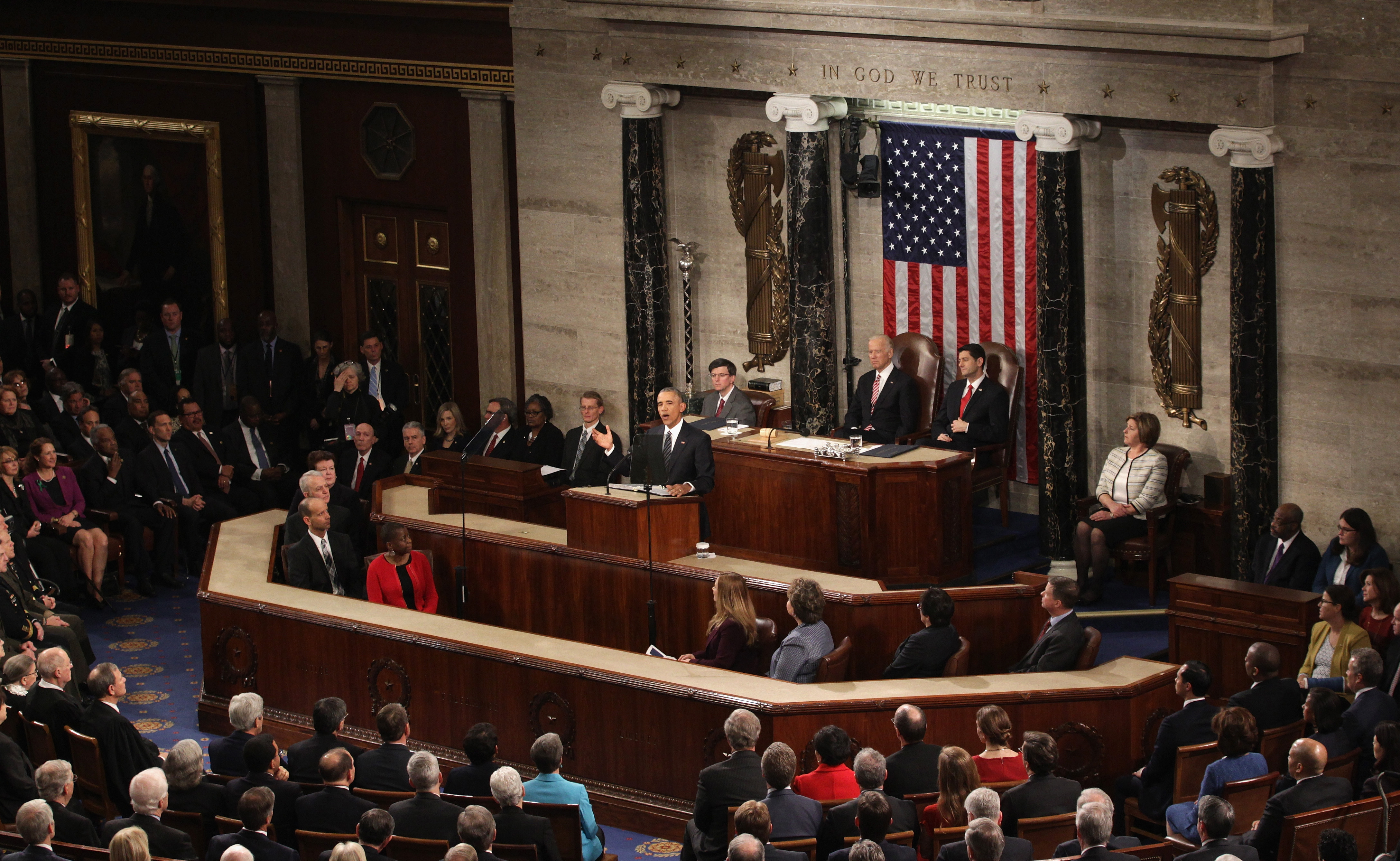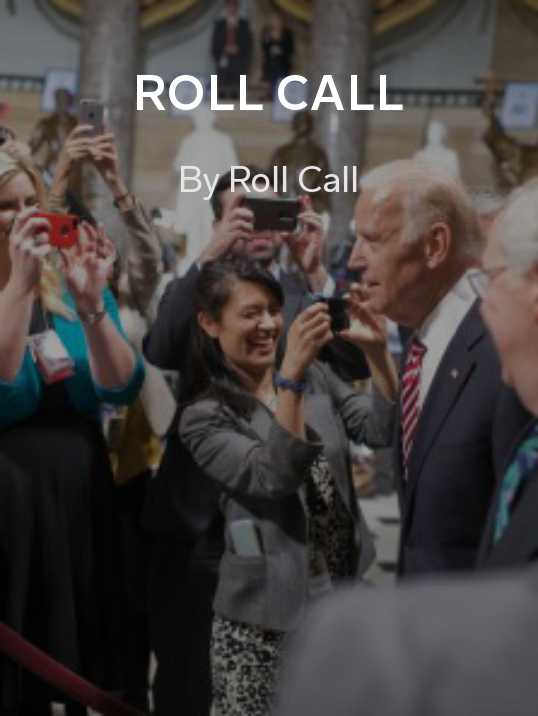Roll Call SOTU Recap: Biggest Moments From Obama’s Address
Gabriella Schwarz / January 13, 2016

In his speech to Congress Tuesday night, President Barack Obama departed from the typical State of the Union format to deliver a message outlining his vision for America’s future. The departure coincides with the start of his final year in office and was met with some consensus and much disagreement from members inside the chamber. We broke down the president’s proposals and rhetoric, as well as South Carolina Nikki Haley‘s Republican response, with Roll Call’s White House reporter John Bennett.
What were the biggest policy proposals from the speech and/or what were the biggest moments of the speech?
In terms of potential size, scope and effect, President Obama‘s self-described “new moonshot,” his declaration that “America can cure cancer.” And by putting Vice President Biden in charge of “mission control” of the initiative, it will have a program manager (so to speak) who has direct access to the Oval Office. Even in the final year of an administration—and even in a year with scant predictions of robust legislative production—that increases its odds of getting off to a successful start.
Some of the biggest moments came when the president talked about the “choices” Americans have to make, beginning with the November elections. Others came when he prodded—and even teased and taunted—Republican lawmakers, which drew some audible groans from the GOP side of the chamber.
In what ways was this speech different than or similar to previous years?
The White House spent most of the past few weeks going to great lengths to make clear this would be an unique State of the Union. And it really was. That’s because Obama chose to skip the typical SOTU format, in which he and other presidents have used the address to lay out a long list of policy items they want Congress to approve over the next 12 months. Obama did some of that, but at the top of the speech pledged to “go easy” on the policy asks. Instead, he delivered a speech that, as his senior adviser Valerie Jarrett told reporters earlier in the day, described “his vision … for the country in five, 10, 15 years.” It was similar to past addresses in that Obama tried to cement major aspects of his own legacy, and deflect any blame for what he clearly sees as a poisonous politics and the “challenges” he will leave behind.
How, if at all, will the president’s address impact his relationship with Congress in his final year?
It’s hard to see how this speech could make the sour relationship any worse. It’s also hard to see how this speech could make it any better. Other than the anti-cancer “moonshot,” there were few—if any—major surprises. And a federal effort like that, if it lasts into the next administration, sounds very expensive at a time GOP candidates up and down the ticket will be running on slashing government spending. So if a pledge to “cure cancer” is an iffy proposition politically, it’s tough to imagine Republicans suddenly running down Pennsylvania Avenue to join hands with Barack Obama. Insiders believe criminal justice reform should get to the president’s desk, but that might be the one area the two sides can work together on in Obama’s final months.
How do you expect Obama’s agenda to shift going forward?
Very little. As mentioned above, criminal justice reform has been on the White House’s wish-list for some time. So that’s not an agenda change. The anti-cancer initiative should get more attention, but it’s unclear just where that ranks on his agenda given the scope of something like that and his few remaining months in office. On national security, a crisis could alter his agenda quickly. But shy of a catastrophic event like a major terrorist attack, the president mostly doubled down on his long-game strategy for combating threats like the Islamic State.
We see the lists of famous State of the Union lines every year. Will any of tonight’s lines make future lists? If so, which one(s)?
Obama certainly has been known for rhetorical flourishes, which is why it was interesting to me that his final SOTU featured so few. I thought this one met that definition: “That’s the America I know. That’s the country we love. Clear-eyed. Big-hearted. Optimistic that unarmed truth and unconditional love will have the final word.”
And as someone who covered foreign policy and national security for a long time—and even studied it in graduate school—this portion stood out: “The United States of America is the most powerful nation on Earth. Period. It’s not even close. It’s not even close. It’s not even close. … No nation dares to attack us or our allies because they know that’s the path to ruin. … And when it comes to every important international issue, people of the world do not look to Beijing or Moscow to lead – they call us.”
Was Nikki Haley‘s speech a success?
It was a success. She was firm but reasoned. She criticized Obama. But she also took her own party to task. Haley described a GOP agenda she said a Republican president would abide by that likely sounded very good to the party’s base. But she did so in a manner that set her apart from the bombast of the 2016 Republican presidential primary: she was mostly upbeat.
How did Haley help or hurt her future political aspirations?
She helped her own aspirations, if she has them. With Republican presidential candidates hammering Obama for every problem facing America, Haley took another approach. While she criticized the president plenty, she also called on her own party to admit its role in creating those problems. And she took a not-so-veiled shot at GOP front-runner Donald Trump, urging voters to avoid following “the siren call of the angriest voices.” She called for major immigration policy changes, but cast a much different tone than Trump, saying: “No one who is willing to work hard, abide by our laws and love our traditions should ever feel unwelcome in this country.” She also used her decision to remove the Confederate flag from South Carolina’s statehouse grounds as a moment of unity.
Read more from Roll Call in their Flipboard Magazine and keep up with the candidates and issues in 2016 Election Central.

~GabyS is reading the Paul Ryan topic
GET FLIPBOARD ON:
iOS / ANDROID / WINDOWS / WEB
FOLLOW US ON:
FLIPBOARD / TWITTER / INSTAGRAM / FACEBOOK / GOOGLE+ / TUMBLR / YOUTUBE / SOUNDCLOUD / PINTEREST / MEDIUM




